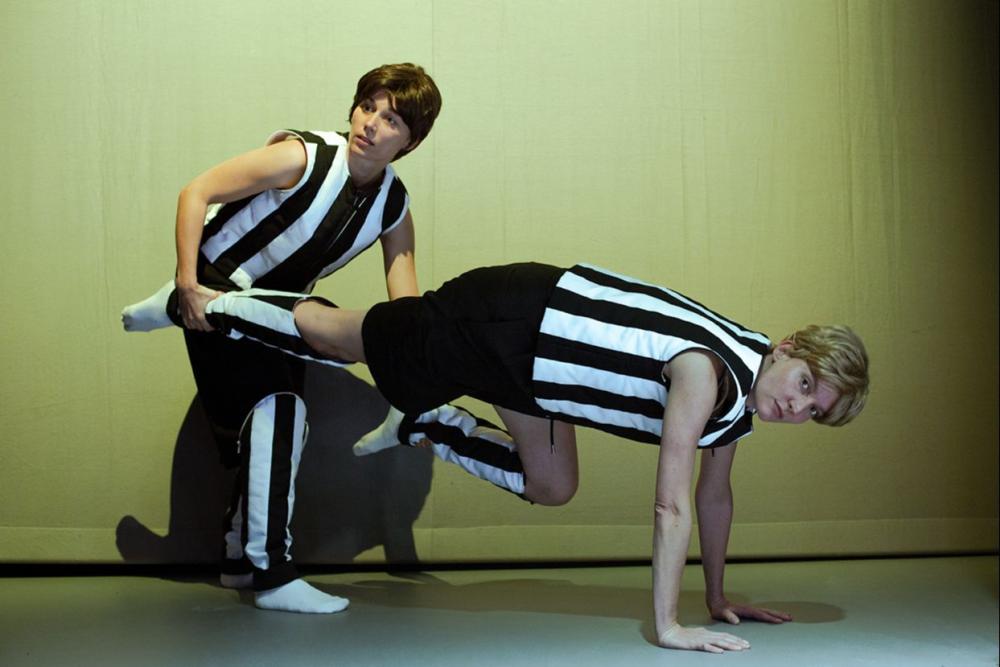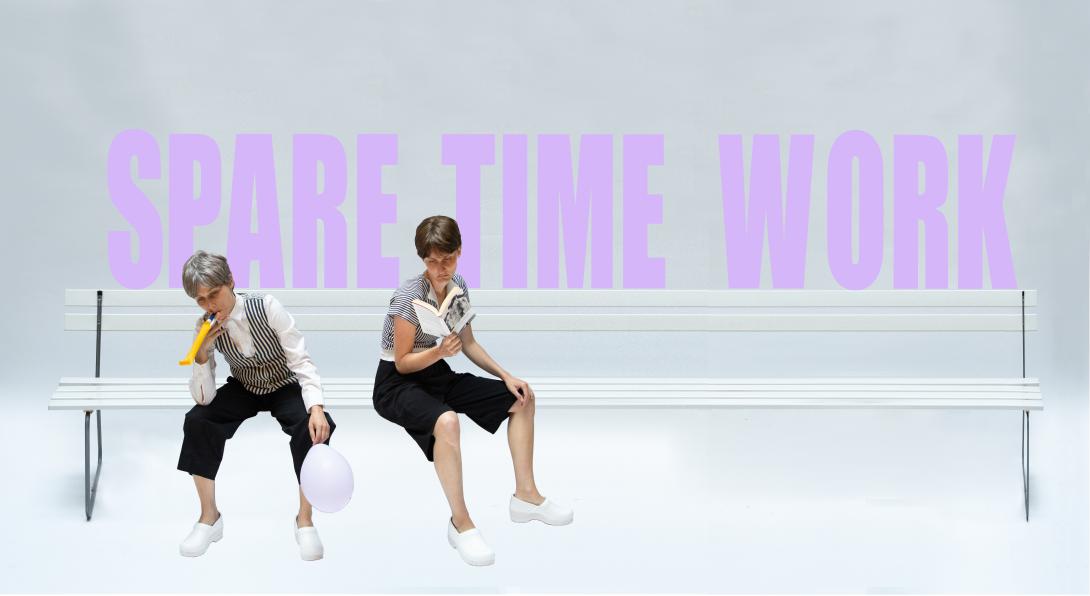| ma | di | wo | do | vr | za | zo |
|---|---|---|---|---|---|---|
|
1
|
2
|
3
|
4
|
5
|
6
|
7
|
|
8
|
9
|
10
|
11
|
12
|
13
|
14
|
|
15
|
16
|
17
|
18
|
19
|
20
|
21
|
|
22
|
23
|
24
|
25
|
26
|
27
|
28
|
|
29
|
30
|
31
|
|
|
|
|
Lees meer - SPARE TIME WORK
Lees het digitaal programmablad van SPARE TIME WORK met twee interviewfragmenten met buren.
Lees hier de korte inhoud van de voorstelling en de credits.
Wanneer ben je niet aan het werk als àlles een vorm van inspiratie kan zijn
Interview met buren, door Frank Geypens (STUK)
Vanwaar komt de inspiratie voor SPARE TIME WORK?
Onze interesse in vrije tijd kwam al aan bod in eerdere werken. Het belang om ook het aspect 'werk' onder de loep te nemen, groeide o.a. door onze eigen relatie en verhouding tot arbeid en vrije tijd als kunstenaar, waarin het een in het andere overloopt. Wanneer ben je niet aan het werk als àlles een vorm van inspiratie kan zijn die je creatief 'aan het werk' kan zetten? Maar ook hoe ideeën rond arbeid en vrije tijd gevormd worden door bv. eerdere jobs en je achtergrond. Wat betekent het om te moeten, mogen, kunnen werken en welke machtsverhoudingen spelen een rol? De machtsverhoudingen binnen het theater intrigeren ons al lang: het publiek komt kijken in hun vrije tijd, met een bepaalde verwachting, de performer is aan het werk en heeft de macht heeft om iets te laten zien. Het is een privilege, maar ook iets waar je hard voor werkt. En tegelijkertijd een enorm plezier. Naast wat er te zien is op het podium doe je als kunstenaar natuurlijk nog veel meer. We zeggen vaak dat we ook een verhuis- of kuisfirma zijn. Of mensen vroegen ons eens of we interieurvormgevers waren.
De opties die we 200 jaar geleden zouden gehad hebben zijn zo anders dan die we nu hebben. Kort gezegd kon je 'vrouw van', 'meid van' of non worden. M.a.w. huismoeder of moeder overste, en dat waren nog de beste opties. Met een beetje geluk had je dan al mogen leren lezen. Maatschappelijke veranderingen zijn het resultaat van mensen die er (vaak in hun vrije tijd) 'werk van maken' om op te komen voor bv. sociale en ecologische kwesties, arbeidsrechten, het recht op vrije tijd, de rechten van de vrouw en bepaalde minderheden. We hebben de ambitie om met ons werk, via onze verbeelding, zaken aan te kaarten, te ontdekken en in beweging te brengen.
Kunnen jullie iets vertellen over het productieproces?
We zijn al sinds maart 2020 bezig met SPARE TIME WORK. Het productieproces was nogal woelig onder het bewind van queen Corona en na de kaalslag van veldheer Jan Jambon. De 'break' tijdens de tweede lockdown zorgde voor verschillende afgeleiden: de geluidswerken Services, situations and other floors voor het online festival 'a room with a view' van workspacebrussels, een tekstwerk voor de nieuwsbrief van ROSA vzw, de muziekvideo van COMPUTER_SONG en de presentatie daarvan met computer cocktails en een aan de computergerelateerde playlist, foto collages voor Tim Magazine's issue over artistieke relaties en het Linda Nochlin magazine van Kiosk, een installatie rond devotie, Mother Hood en Artist Hood in het Sint-Janshospitaal museum via Kaap in Brugge.
SPARE TIME WORK kende door de pandemische omstandigheden twee fasen. Ons team veranderde deels, we konden wat afstand nemen van ons materiaal en er verder mee spelen. Ondertussen blijven er afgeleiden bijkomen, een bijdrage in het nieuwe issue van het literaire tijdschrift nY#48 - Onze moeders, en dit najaar zullen we de publicatie "STW, Your favourite station!" uitgeven bij het balanseer.
Hoe kozen jullie de verschillende personages?
De personages functioneren eerder als figuren waar wij ten dienste van staan, maar die het ook mogelijk maken om te spelen. Het zijn spilfiguren die ons helpen tijdens de creatie om bepaalde machtsverhoudingen en ervaringen te delen. Ze zijn een assemblage van specifieke representaties, ervaringen, dromen en verlangens. Soms zijn ze eerder helder, dan weer ambigu. Ze bewonen verschillende (sociale, politieke) realiteiten in ons universum.
For us it's important to show a critical reflection through playful imagination
interview with buren, by Dlisah Lapidus (Subbacultcha, 2021)
In a theatre space at Buda in Kortrijk, Oshin Albrecht and Melissa Mabesoone of Buren collective introduced us to the characters in their upcoming performance, Spare Time Work. We watched as they played on the stage, the coloured LED lights illuminating their wigs and yellow checkered shorts. Then, we sat down to discuss their upcoming performance at Festival Playground in STUK, and what Spare Time means to artists, audiences, women, and a post-pandemic world.
What can we expect from Playground Festival?
Oshin: Playground is a hybrid festival from STUK, and Museum M in Leuven. They really want to show the crossover between visual arts, performing arts and everything in between. Our background is actually visual arts, but from the moment we started working together, almost 10 years ago, we started making performances, along with visual art like objects, prints, books and videos.
Melissa: At Playground, we've shown the first version of Blue Skies Forever in 2017, and now we will premiere Spare Time Work.
O: We really wanted to work in the theater space for Blue Skies Forever. We always want to take the context into account, but to work in that context, we needed partners, and Playground was the first festival who wanted to host us in that sense. They were really interested in our whole practice. So it really meant a lot that we can work (and play) at STUK. They hold a special place with us.
M: We started questioning the parameters of what it means to perform in a visual art context. There are people that are coming to watch you, or people that are passing by and watching you, which are very different. We wanted to play with the idea of somebody buying tickets to come and see you, and you prepare something to show them. You have to deal with the expectations the audience has, but also the power and the privilege you have to be on that stage and claim the space.
Tell me about your performance, Spare Time Work?
M: For the performance, we were interested in the fact that an audience enters a theater in their spare time, and we are working as performers or creators. For us, as artists, this division between labor and free time is quite blurry. The idea of leisure was something that has been very present in our work since the beginning, but we didn't want to just make something about leisure, we wanted to connect it to labor and the many facets involved in this idea of spare time work.
O: But also, as an artist, your spare time really slips into work time, and the other way around, there is no division. Although we experience a lot of pleasure being able to do the work that we do, getting somewhere that you want to go, even the end product of a performance, takes a lot of hard work. These blurred lines between pleasure and hard labor are very vague and confusingly intertwined. We really tried to express the ambiguity of these different states.
M: And the audience sees both. The hard work that we put into it, but also the pleasure that we have while being and playing on stage.
The way our work is constructed is almost the way a dream functions. The way you act in a dream seems logical, a kind of digestion of many things that are happening in your life, things that you read, or saw online, or in movies, all get mixed, experiences, sensibilities. The differences between right and wrong, good or bad, are way more mixed. I think the idea of a dream is a bit like the dramaturgy in our work.
Does this idea of a dream also contribute to a surrealist atmosphere in your work?
M: There is definitely a surreal aspect to our work, but I think it also comes out of a curiosity, and an almost childlike interest in objects, certain mechanisms…
O: We also construct these very mundane situations entirely anew in a somewhat surreal way.
M: We try to not take things for granted that are normally taken for granted, but then also sometimes act as if things are completely normal or logical to do.
What is the significance of the many costumes and props in the performance?
O: We like to collect things that spark imagination. With the costumes and props we constantly reshape ourselves, and we reinterpret objects in many different ways. We merge concepts with objects and costumes and our bodies. We really enjoy being able to constantly transform from one thing to another.
M: It’s not necessarily about different versions of ourselves or becoming a character, although we have names for them and they are characters in a way. Mostly they function as figures that we inhabit which help us to show the gradient of things in life. I think these costumes help us to understand certain things, and hopefully help the audience as well.
How do you inhabit these characters?
O: There is always a search to figure out who these characters are and what we want them to represent, because we create the figures, but at the same time we need to understand them. Becoming them is also trying to understand them, but we know that we can’t be them, so instead we learn how to play with them.
M: With our work, it’s Oshin and Melissa playing, and then playing these characters. We set up a game which we play together, so we do have to get used to these characters and experience how they interact. They also transform quite fast, they shift one into the other.
You came up with this idea of Spare Time Work before COVID, has this caused a development in your ideas?
M: I think that now everyone has experienced something similar over the last few years, having to work and play in one place, or not having any spare time because they were working at home, there has been this complete blurriness. We became very aware that when people see the performance, this might be part of their association.
O: Also our personal experiences and histories are very prominent in the piece. What does it mean for our work-life balance if our life is our work. Also as a woman, how do you plan your life? If we are not mothers to little humans, is this work our ‘baby,’ can we call ourselves mothers of our work?
M: We ask, ‘If this work is our baby, what kind of mothers are we?’(laughs)
We also spent so much time together, for such a long time, and then during the lockdown we didn't see people as much. I think in Spare Time Work, our relationship, and this artistry that we share is part of the work.
O: Also, if you think about work ethics, and ambition, there are many different ways of dealing with it, which is very present in the work now. I am very happy that this is there. We were looking into the history of work and spare time and the rights to work and the right to spare time. I feel that we could take a walk with this history in a lived present.
M: For us it's important to show a critical reflection through playful imagination.

